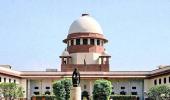The Supreme Court on Wednesday said a prior sanction will precede the prosecution of public servants accused of money laundering charges in discharge of official duty.

A bench of Justices Abhay S Oka and Augustine George Masih, therefore, dismissed a plea of the Enforcement Directorate challenging a high court verdict that quashed the cognisance order of the agency's complaint (chargesheet) against two IAS officers.
The Telangana high court had quashed a trial court order taking cognisance of the ED's prosecution complaint filed on money laundering charges against the two senior bureaucrats in the Andhra Pradesh government.
The bench referred to Section 197(1) of the CrPC (corresponding to Section 218 of the Bhartiya Nagrik Suraksha Sanhita, 2023) dealing with prosecution of judges and public servants.
Section 197 (1) says, "When any person who is or was a judge or magistrate or a public servant not removable from his office save by or with the sanction of the government, is accused of any offence alleged to have been committed by him while acting or purporting to act in the discharge of his official duty, no court shall take cognisance of such offence except with the previous sanction."
The bench said the object of Section 197 (1) of the CrPC was to protect public servants from prosecutions and it ensured they were not prosecuted for anything they did in the discharge of their duties.
"This provision is for the protection of honest and sincere officers. However, the protection is not unqualified. They can be prosecuted with a previous sanction from the appropriate government," it said.
It said, "Considering the object of Section 197(1) of the CrPC, its applicability cannot be excluded unless there is any provision in the PMLA which is inconsistent with Section 197(1). No such provision has been pointed out to us."
The bench, therefore, held the provisions of the section were applicable to a complaint filed under Section 44(1)(b) of the Prevention of Money Laundering Act (PMLA) while rejecting the ED contention that Section 71 of the PMLA had an overriding effect over the provisions of the other statutes.
The agency had contended that considering the object of the PMLA, the requirement of obtaining a sanction under Section 197(1) of CrPC will be inconsistent with Section 71 of the PMLA.
The bench, however, pointed out that Section 65 of the PMLA made the provisions of the CrPC applicable to all proceedings under the PMLA, provided the same were not inconsistent with the the anti-money laundering law.
"Section 65 is a prior section which specifically makes the provisions of the CrPC applicable to PMLA, subject to the condition that only those provisions of the CrPC will apply which are not inconsistent with the provisions of the PMLA. Therefore, when a particular provision of CrPC applies to proceedings under the PMLA by virtue of Section 65 of the PMLA, Section 71(1) cannot override the provision of CrPC which applies to the PMLA," it held.
The ED had challenged the high court order on the plea of Bibhu Prasad Acharya and Adityanath Das, who were civil servants, and therefore, satisfied the first condition of Section 197(1) according to the top court.
The apex court noted that ED's allegation that Acharya conspired with former Andhra chief minister Y S Jagan Mohan Reddy and allotted 250 acre land meant for a SEZ project to a private company by violating the existing norms.
It also noted that Das, at the relevant time, was the principal secretary in the state government and he too conspired with Reddy and extended favours to another firm by allotting additional 10 lakh litre of water from River Kagna without referring the matter to the Interstate Water Resources Authority in violation of the existing norms.
"In the case of both respondents (Acharya and Das), the acts alleged against them are related to the discharge of the duties entrusted to them. It is not even the allegation in the complaints that the two respondents were not empowered to do the acts they have done. There is a connection between their duties and the acts complained of," the bench said, noting the second condition for the applicability of Section 197(1) also stood satisfied.
The top court upheld the high court order outlining the latter's correct view as the cognisance of the chargesheet was taken without obtaining a previous sanction under Section 197(1) of CrPC.
"We must clarify that the effect of the impugned judgment is that the orders of the special court taking cognisance only as against the accused BP Acharya and Adityanath Das stand set aside," said the bench.
The top court, however, said that ED may move against the two senior IAS officer after obtaining a prior sanction for the prosecution.










